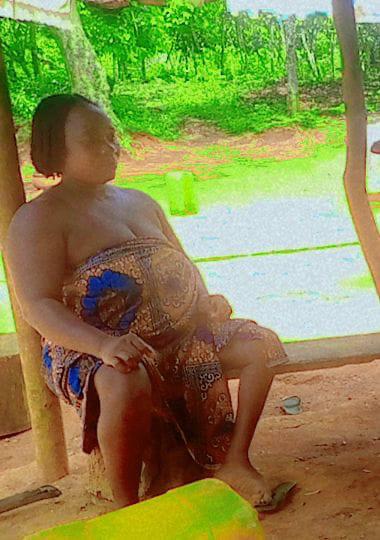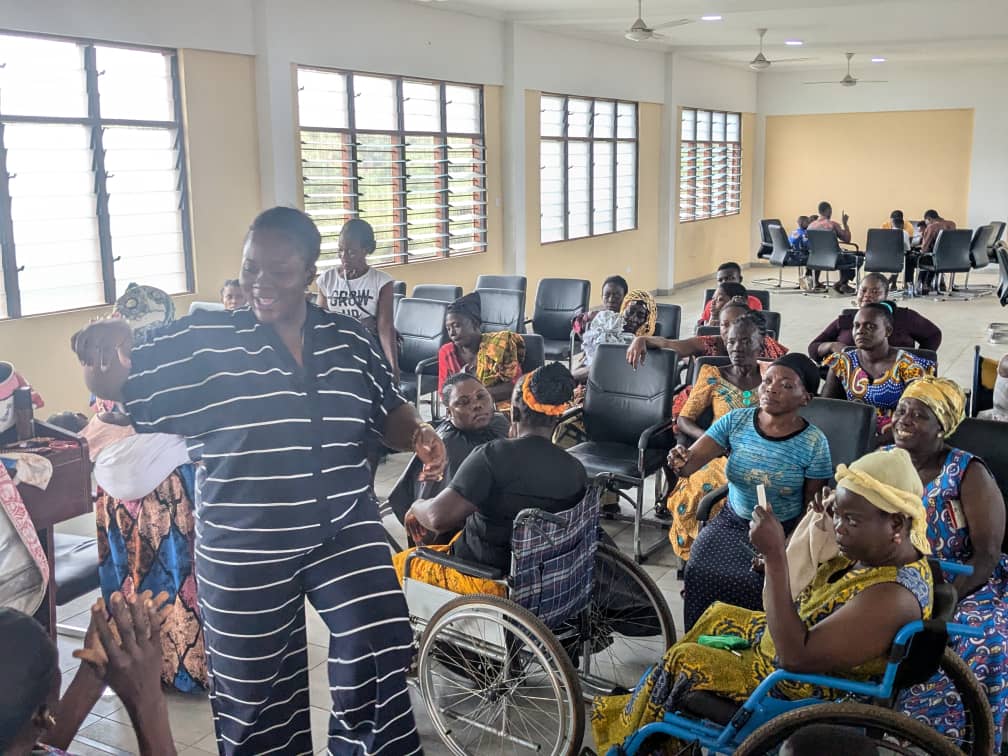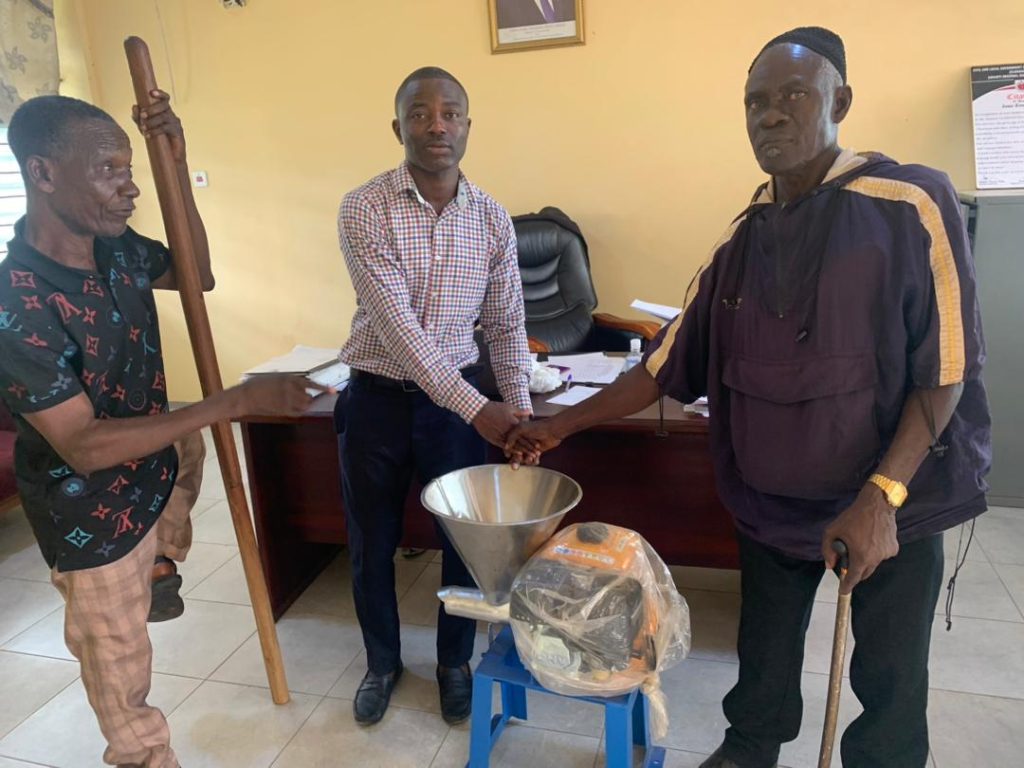— A case of Asante-Akim South
A GNA feature by Yussif Ibrahim
Kumasi, Aug. 28, GNA – In the heart of a “malnourished” cocoa farm at Kumeagya, about 60 kilometers from Juaso, the Municipal capital of Asante-Akim South, lives 40-year-old physically challenged, Rose Mawusi.
Roads
The road leading to the cottage is one that can easily discourage a first-time visitor from quitting the journey midway if not determined to pursue the reason for embarking on the trip.
Kumeagya is a cocoa growing area along the “River Kume” where inhabitants live in their farms under makeshift structures which are mostly kilometers apart.

Rose, whose hamlet is the farthest in the secluded cottage, can barely feed in an environment where access to healthcare is impossible, making her even more vulnerable in the event of emergencies aside from her disability.
Poverty and harsh economic realities forced the mother-of-seven to relocate to the cottage two years ago, after failing to renew her rent at Obogu where she had been engaging in petty trading to take care of her children since the demise of her husband 10 years ago.
CDD Project
As part of a project dubbed, “I Am Aware”, which is being implemented by the Ghana Center for Democratic Development (CDD-Ghana), the Ghana News Agency (GNA) visited Rose in the hinterland to bring to the fore how service delivery by the Assembly could impact her life.
The “I Am Aware” project is a non-partisan citizen empowerment campaign which provides Ghanaians with free user-friendly data on the state of public service delivery in seven areas – education, health, sanitation, water, security, roads, and agriculture.
The goal is to strengthen demand for accountability and responsiveness in Ghana by improving citizen awareness and engagement with duty bearers about public service delivery issues in their communities.
Rose recounted how her late husband, Kwame Kumadro took care of her and the children by providing all their needs compared to their current situation, where affording three square meals had become a daily struggle.
“My late husband made sure I did not lack anything. He would do everything within his power to ensure I and my children were comfortable,” she narrated in tears.
Because the husband was only a caretaker of a cocoa farm he did not own, his family was left impoverished after his demise, leaving Rose with the onerous task of taking care of the children in her vulnerable condition.
According to her, life had been tough since the demise of her husband whose absence left her with the huge burden of providing for the kids from her petty trading which eventually collapsed, forcing her to move to the village.
Relocating to Kumeagya to settle in an abandoned structure in the cocoa farm of her late mother was a tough decision to take after years of living in the vibrant Obogu Township, but it was the only shelter available for her.
Responsibility
Burdened with the responsibility of taking care of four of her children who live with her, Madam Rose told the Ghana News Agency (GNA) that, “Life has been unbearable because I live on the benevolence of old acquaintances who occasionally support me.”
Determined to ensure her children remain in school despite her present location, she has arranged for them to stay with their elder sister at Obogu and only go to Kumeagya during the weekend to take care of domestic chores beyond her strength such as fetching water and firewood.
Beyond providing shelter for her younger siblings to be able to attend school at Obogu, Ama Comfort, a single mother of three can hardly provide for her own children let alone shoulder the financial needs of her siblings.
“It’s been very difficult taking care of my children and younger siblings who spend the weekdays with us so they can go to school,” the second daughter of Rose who lives at Obogu, lamented.
Disability
Although Rose has been captured in the database of the Municipal Department of Social Welfare as one of the over 1,000 Persons Living with Disability (PWDs) in the Municipality, she has yet to receive support almost two years since her registration.
To be able to go to town for any reason, she must raise GHC100.00 to hire a motorbike for the return trip which often leaves her with body ache due to the bad nature of the road.
Auntie Rose, as her children call her, says her desire is to get adequate funds to rent a place at Obogu and set up a small business to take care of her children to save them the ordeal of trekking a round trip of about 60 kilometers from Obogu every weekend.
In contrast to the plight of Rose, another physically challenged who has lived all her life at the Municipal capital owns a thriving business which is putting food on the table without much stress.
Ruth Obeng invested an amount of GHC 1,000.00 she received as a beneficiary of the Disability Fund in 2017 in “iced water” business.
Over time, the business grew with the acquisition of an additional deep freezer which was solely used for making iced cubes mostly patronised by women selling soft drinks and water at the Juaso main junction along the Accra-Kumasi highway.
“With time, I decided to diversify my business, so I started selling footwear and bags which have also been doing well,” she told the GNA in an interaction.
She said with prudent management and determination to succeed, she had been able to make a living out of the support she received as a beneficiary of the Disability Fund.
I can take care of my children outside of this business, and I am glad the Assembly came through for me when I was in distress, she noted.
Sustainable livelihood
She encouraged other beneficiaries to put items and funds they receive to effective use for sustainable and independent livelihood.
The contrasting stories of Rose and Ruth highlight how service delivery by the District Assembly may positively impact the lives of the vulnerable but exposing the equity gaps.
The two are both women whose conditions require some form of support to live independently without having to rely on others for their livelihoods, and one would have thought Rose who lives in one of the remotest places in the Municipality would have been prioritised as far as the disbursement of the Disability Fund is concerned.
Her condition, undoubtedly, needs urgent attention under normal circumstances compared to those residing in urban centres who have access to other social services by virtue of their location.
Statistics
However, the disbursement of the Fund is purely based on who applied first and does not make room for persons with critical needs to be given priority.
Currently, a total of 1,155 PWDs including 531 males, and 624 females have been registered by the Department of Social Welfare at the end of the second quarter of 2024.

Out of this number, 725 have been supported, according to Mr. Isaac Agyin, the Municipal Director of the Department of Social Welfare, who admits that more could be done to improve the lives of the vulnerable.
He believes that beyond the Disability Fund, a special fund dedicated to investing in PWDs should be set up by the Assembly, arguing that the enormity of the challenges confronting them requires more than the Disability Fund.
“Some of them are really doing well with the little that the Assembly provided them through the Disability Fund, especially those who requested for deep freezers as well as the ones who have started provision shops,” Mr. Agyin said in response to how the support is impacting the lives of beneficiaries.
He said the Department discovered during monitoring that some of the beneficiaries who live alone and unable to engage in any income generating activity had given their support to other relatives to work and remit them monthly.
“The disbursement of the funds is impacting the lives of the beneficiaries because without it their situation would have been worse and it is our hope that it will be extended to more PWDs in the Municipality as and when funds are available,” he noted.
The Department, according to Mr. Agyin, has also been facilitating apprenticeship training for some of the PWDs and other vulnerable groups by engaging various skills training associations to train them to enable them to acquire some form of employable skills.
He said when some of these women report child maintenance cases against irresponsible fathers of their children, the Department takes steps to link those interested in apprenticeship with identified professionals to learn a trade.
This, he said, underscored the need for a dedicated fund to support such people in the acquisition of tools and other materials needed for them to undergo the training to empower them to take care of their kids.
Despite the gaps in terms of equity and accessibility to the Fund by many PWDs in the Municipality, the Municipal Chief Executive, Mr. Alexander Frimpong, believes the impact of the Fund on beneficiaries is one of the most fulfilling interventions he had overseen as the political head of the Municipality.
He said it is always refreshing to see some of the beneficiaries who hitherto were struggling to fend for themselves but are now engaged in meaningful ventures that are putting food on the table.
“I am filled with joy any time I see some of the beneficiaries putting the support they received to good use,” Mr. Frimpong proudly stated.

The MCE backed the call by the Social Welfare Director for a special fund to augment the Disability Fund but suggested that it should be private sector led so that all well-meaning citizens could contribute to the welfare of all vulnerable groups across the Municipality.
Alternatively, he suggested that the disability component of the District Assemblies Common Fund (DACF) should be increased from three to five per cent to enable more PWDs benefit from national resources.
The success story of Ruth may inspire hope in the disbursement of the Disability Fund through the District Assembly, but the condition of Rose also reflects the plight of some of the outstanding 430 PWDs yet to be attended.
It is therefore imperative for the Department of Social Welfare to assess the needs and conditions of PWDs captured in their database to determine those who need urgent intervention to improve their living conditions to serve the purpose of the Fund.
This will ensure service delivery by the Assembly is more impactful, especially on the lives of the vulnerable and marginalized, who require social protection from the harsh economic conditions and discriminatory society.
GNA